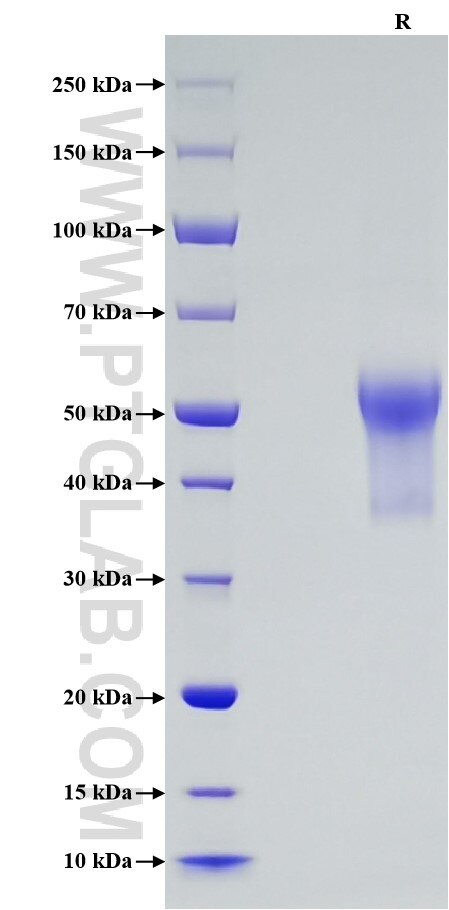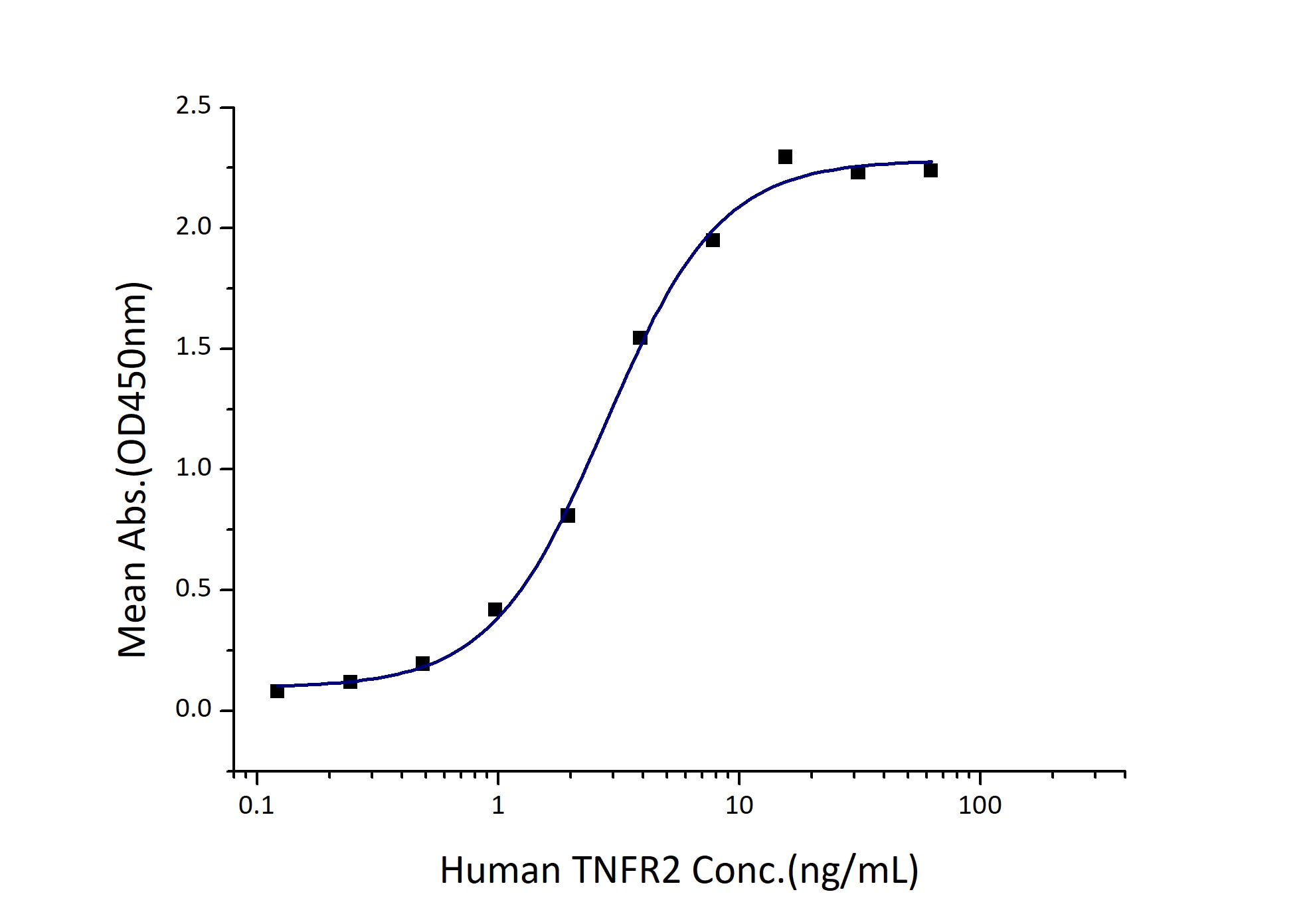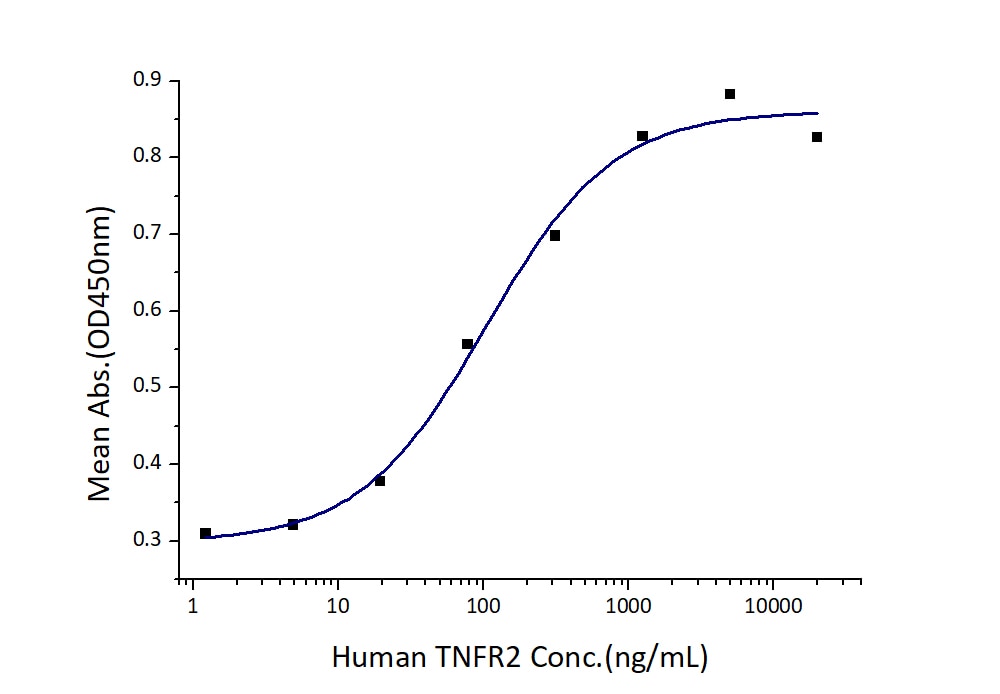Recombinant Human TNFR2/CD120b protein (Myc Tag, His Tag)
Species
Human
Purity
>90 %, SDS-PAGE
Tag
Myc Tag, His Tag
Activity
EC50: 1-5 ng/mL
Cat no : Eg0086
Validation Data Gallery
Product Information
| Purity | >90 %, SDS-PAGE |
| Endotoxin | <0.1 EU/μg protein, LAL method |
| Activity |
1. Immobilized Human TNF-α (GST tag) at 2 μg/mL (100 μL/well) can bind Human TNFR2 (Myc tag, His tag) with a linear range of 1-5 ng/mL. |
| Expression | HEK293-derived Human TNFR2 protein Leu23-Asp257 (Accession# P20333-1) with a Myc tag and a His tag at the C-terminus. |
| GeneID | 7133 |
| Accession | P20333-1 |
| PredictedSize | 30.4 kDa |
| SDS-PAGE | 48-58 kDa, reducing (R) conditions |
| Formulation | Lyophilized from 0.22 μm filtered solution in PBS, pH 7.4. Normally 5% trehalose and 5% mannitol are added as protectants before lyophilization. |
| Reconstitution | Briefly centrifuge the tube before opening. Reconstitute at 0.1-0.5 mg/mL in sterile water. |
| Storage Conditions |
It is recommended that the protein be aliquoted for optimal storage. Avoid repeated freeze-thaw cycles.
|
| Shipping | The product is shipped at ambient temperature. Upon receipt, store it immediately at the recommended temperature. |
Background
Tumor necrosis factor-alpha (TNFA/TNFSF2) is a multifunctional cytokine that plays a key role in regulating inflammation, immune functions, host defense, and apoptosis. TNFA signals through two distinct cell surface receptors, TNFR1 (TNFRSF1A, CD120a, p55) and TNFR2 (TNFRSF1B, CD120b, p75). TNFR2 is a kind of receptor with high affinity for TNFSF2/TNF-alpha and approximately 5-fold lower affinity for homotrimeric TNFSF1/lymphotoxin-alpha. The TRAF1/TRAF2 complex recruits the apoptotic suppressors BIRC2 and BIRC3 to TNFRSF1B/TNFR2. This receptor mediates most of the metabolic effects of TNF-alpha. In contrast to TNFR1, TNFR2 does not have a death domain. TNFR2 only signals for antiapoptotic reactions. However, recent evidence indicates that TNFR2 also signals to induce TRAF2 degradation. Various defects in the TNFR2 pathway, due to polymorphisms in the TNFR2 gene, upregulated expression of TNFR2 and TNFR2 shedding, have been implicated in the pathology of several autoimmune disorders.
References:
1.Islam A. et al. (2006). J Biol Chem. 281(10):6860-73. 2.Pan S. et al. (2002). Mol Cell Biol. 22(21):7512-23. 3.Faustman D. et al. (2010). Nat Rev Drug Discov. 9(6):482-93.



